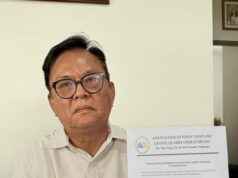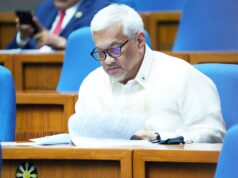CLARK FREEPORT – A Catholic bishop in nearby Angeles City is calling for a “back to tap water” advocacy as part of the environmental initiative of the Church.
The existence of the “budding” advocacy was disclosed Friday by San Fernando Auxiliary Bishop Pablo Virgilio “Ambo” David, explaining that the plan is a major component of the overall pro-environment advocacy that the Church intends to actively pursue.
This developed even as corporations and proprietors that make up the domestic bottled and purified water industry may have to take pre-emptive actions to overcome, or at best neutralize, a possible negative impact on their viability.
But David said the main intention is to encourage Filipinos to return to tap water and avoid or reduce the consumption of bottled water as he justified this action which he said is borne by the Church’s desire to help reduce the sources of activities that degrade the environment and also help promote the well-being of the public in terms of an affordable cost of living.
He said by distilling water, you remove a lot of its minerals. “Tap water is still a lot healthier than bottled water and people are not aware of the whole process that by the time the distilled water is bottled and is transported, makes it unsanitary at some point,” he added.
“Our only worry with tap water is: ‘Are the pipes clean?’ But that’s the responsibility of the water districts. The consumers have the right to demand clean water. That’s basic human rights,” said David.
“I never thought I would live to see the day that water will be sold in bottles, David said. “We used to drink tap water, what happened? Why did we resort to drinking bottled water?” he asked. David said the plan is to initially touch base with Pampanga’s local water districts and convince them to ensure that the water they deliver via their piping networks to their concessionaires “is really potable, bereft of harmful bacteria.”
The availability of clean tap water would hopefully encourage consumers to drastically reduce, if not totally cease, consuming bottled or the now popular purifi ed water,” David said. If successful, this experiment could be replicated in other Catholic parishes in the country, according to the bishop.
Data on domestic consumption of bottled water, including purified tap water, are scant. Accordingly, industry figures collated by the National Statistics Office are peddled through private research agencies.
Still, global data indicate that the bottled water, and its allied business is booming, which indicates the domestic trend. In 2008, for instance, worldwide consumption hit 53 billion gallons, marking a sharp increase from previous year’s figures.
Between 1997 and 2005, bottled water consumption more than doubled, the primary reason behind this is that bottled water is sometimes the only safe drinking water available, in this case, in the Philippines and even in other countries.
David argued that the Philippine situation in terms of available potable tap water compared to other underdeveloped countries is better, given the existence of various local water districts now in operation.
All that is needed is to ensure that the tap water is safe and clean, the bishop said, adding that part of the Church’s plan is to invoke consumer welfare in its pro-tap water campaign.




